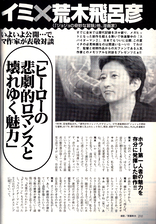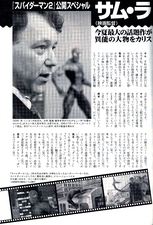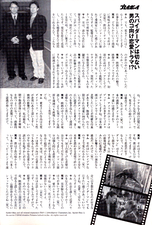Aomaru Jump (February 2004)
Interview Archive

An interview with Hirohiko Araki and Sam Raimi about Spider-Man 2 from the July 2004 issue of Shueisha's Playboy magazine.
Interview
It's finally open to the public... And now a courteous interview with the director
"Spider-Man 2" is already breaking records one after another in the United States, surpassing its mega-hit predecessor. It's finally released in Japan, and it's definitely a must-see movie this summer!! Thus, we present a memorable conversation between the director and a popular writer who has been a big fan of his early works!!
A new work that fully demonstrates the horror expert's charm!!
Araki: Having finished "Spider-Man 2", I can honestly say it was just as good as the first one.
Sam: Thank you. I was also shown your work, Araki, and it was quite wonderful. I was really impressed.
Araki: Oh, please (laughs). On the other hand, I do think Spiderman 2's direction was more relaxed than the previous one.
Sam: That's for sure. I felt like I was making an independent work like in the old days. It's a strange thing to say considering the budget (200 million dollar production, a record high!), but I had a lot of freedom.
Araki: I've always been a big fan of your taste in direction. For example, small scenes such as when the nails screeched from being dragged left an impression.
Sam: You're very perceptive (laughs). When I saw your work, I had a feeling you'd be the type to notice those kinds of moments. I'm proud to say now that the skills I've cultivated as a horror writer can still be put to good use here and there. I wanted the audience to be frightened with how scary the villain was, so that was a method I used to show suspense and make your heart race. Maybe that's what reminds me of my old works.
Araki: I know what you mean. Another characteristic of your works is how they depict the process of 'breaking down'. There's physical destruction too, but I think the process of shattering the character's spirit is especially evident. The same thing happened in "The Evil Dead" and "Darkman". In "Spider-Man", the main character, Peter, fell into a slump.
This summer's most talked-about film features a charismatic big shot with a unique power.
Sam: That's a very interesting way of looking at it. I've never thought about that before, but I guess I'm definitely drawn to main characters that have mental weaknesses and flaws.
Araki: Mental stress made Peter lose his web,[1] so to speak. The zombies in "The Evil Dead" were also afraid of their minds being broken from being possessed by evil spirits. In "Darkman", his mind was rapidly changing. I think that's the appeal of the films you direct.
Sam: Actually, I'm very interested in the fact that people make mistakes. Although it's a really tragic thing, it's wonderful when people are able to get back up and feel a sense of accomplishment from succeeding in something after. I think that's basically the story of "Spider-Man".
Araki: That's especially the case this time around. That's why I'm looking forward to seeing Peter's best friend, Harry (in the previous film, his father was killed by Spider-Man after turning into the Green Goblin). Most of your films have characters wearing masks, but I'm curious about why you keep removing them? It almost seems like you want to get rid of the masks (laughs).
Sam: You're right. I did the same thing in this movie as well (laughs). My intention is to show the audience the character's face and make them look into their eyes, so they can feel the pain and emotions that the character is feeling at that moment. That's why I have them torn off.
Araki: I felt that in "Darkman" as well. Though I think one of the most appealing things about "Spider-Man" is the misunderstandings from the people around him since his true identity hasn't been exposed. I'm worried that if you direct the next 3 films, you'll have a hard time (laughs).
Sam: I'm currently planning the next one in my hotel room. I'm having a very hard time. If you have any good ideas, please contact me in my room this evening (laughs).
Araki: I've got plenty of ideas (laughs).
Spider-Man is a sad romantic drama for boys?!
Sam: Even so, you seem like you'd be great as a CGI artist, Araki.
Araki: I'm more interested in drawing... (wry smile). I feel like the reason I became a manga artist was because of Gauguin and Jasper Johns. What made you interested in directing?
Sam: Honestly, I wasn't influenced by anyone's 'masterpiece' or anything. My father had a 16mm camera, and when I first saw my first 'home video', I was amazed. You could capture and recreate reality, as well as alter the order of events and mess with time. I wondered if it was possible to have such a thing in the world.
Araki: Your attraction to movies itself came from the magic of videos?
Sam: Exactly. Therefore, I think the challenge with my first film was how I could use that as a medium. What can I give to the audience with cutting, camera work, lighting, and sound effects?
Araki: Your direction has had a great influence on my works. For example, if something is reflected in a character's eye, the 'camera lens' will zoom in on it.
Sam: When details like that are depicted properly, it helps bring life to the work. You get the sense that it's actually depicting a real human memory. Your framing in particular is fantastic, Araki.
Araki: Thank you (laughs). Do you sense any difference between Japanese manga and American comics?
Sam: American comics tend to have too much detail, giving them a very chaotic look. I find Japanese manga to be a bit more clear-cut in what it's trying to express; it's very simple and elegant by nature. Story-wise, comics cater to a rather limited audience. I think it’s wonderful that manga considers a much broader demographic and involves many people.
Araki: CGI's becoming more of a thing in movies, though. It's going to be very difficult to adapt manga unless the medium starts using more wide-angle shots.
Sam: Your works are very dynamic, Araki. I think they have an extraordinary amount of originality. The fact movies influence them, that's a good thing. Though these days, I'm becoming more interested in the people and the stories themselves. I'm also beginning to understand how the technical side of things can be used as tools of expression.
Araki: Is that so? As someone who writes stories myself, I'm quite a fan of "tragic love", which was a big aspect of what I liked about "Spider-Man." It would have been great if, at the end of "Spider-Man 2," you did something like "The Graduate," where Mary Jane is a bride who gets snatched away (laughs).
Sam: That's a pretty good idea; you might see it in "Spider-Man 3" (laughs).
Araki: I did like how the movie ended on a somewhat solemn facial expression, as if the future seemed uncertain.
Sam: I made MJ have a sad expression by putting myself in her shoes. Romance is something that I personally love very much, and it seems that my interest in it melded into this film. Now that I think about, the original comics are also essentially a 'romance' story for men. American boys are too shy to read plain love stories. Is that the case in Japan?
Araki: I’ve liked those type of books since I was a kid. Rather than seeing a happy ending, Japanese people like it when they’re torn apart by fate, so it’s nice that even "Spider-Man" has the feeling of wanting to cry. Love is a painful thing (laughs).
Sam: Do you convey that to your readers through your work?
Araki: Let's just say I've had many painful experiences in real life, too (laughs).
Sam: So you're an expert on love (laughs). I don't have that much experience myself.
Araki: Oh, really (wry smile). Anyways, I'm glad I was able to talk to you today. I'm looking forward to "Spider-Man 3". You'll be directing it, right?
Sam: That's the plan. The other day I overheard the higher-ups of the movie company talking about making up to six, and I was so shocked that my heart stopped (laughs).
[Translated by Vish and MetallicKaiser (JoJo's Bizarre Encyclopedia)]
いよいよ公開…で、マ作家が表敬対談
すでに全米では歴代記録を次々破り、メガヒットとなった前作を超える勢いで快進撃中の「スパイダーマン2」。日本でもついに公開、この夏イチの必見映画なのは間違いな~い!! てわけで、監督と初期作品からの大ファンである人気作家とのメモリアルな対談をプレゼンツだぁ!!
ホラー第一人者の魅力を存分に発揮した新作!!
荒木: 今回の『スパイダーマン2』を拝見して、ほんと、前作に勝るとも劣らない面さだと思いました。
サム: ありがとう。私も荒木さんの作品を見せてもらいしたが、大変素晴らしいですね。非常に感激しました。
荒木: いや(笑)。でも、この2を見て、前回よりすごリラックスして演出されてるょうに感じたんですけど。
サム: それは間違いないです。昔のようにインディペンデントな作品を作ってる感覚というか。この予算(史上最高の製作算220億!)でそれも変な話ですが(笑)、自由度高かったですから。
荒木: 細かいシーン、例えば、が引きずられて爪がギギギーッっていう感じとか、昔ら大ファンの僕からすると監督のテイストがいっぱい。
サム: 鋭いですね(笑) 。あなたの作品を見て、そういうー的瞬間を感知する方だろうと思いましたが。私も今回、随所で今までに培ったホラー作家としての技術が大い活きてると自負してるんです。悪役がどれほど怖いか、客を怯えさせたかったし、ドキドキハラハラさせる手法を見せたくて。それが昔の作を思い出させるのかも。
荒木: すごくわかる気がします。あと、特徴的なのが壊れていく過程を描くというか。物質的な破壊もあるけど、登場人物の精神が壊れていく過程に特に出てると思うんですね。『死霊のはらわた』とか『ダークマン』もそうだったし。『スパイダーマン』では主人公のピーターがスランプに陷っていって。
今夏最大の話題作が異能の大物をカリス
サム: それは非常に面白い見方ですね。今まで考えたことがないな。でも、確かにそういう主人公の精神的な弱さ、欠点を持っているところに惹かれたのはあります。 荒木: 精神的なストレスで糸が出なくなったり。『死霊のはらわた』のゾンビも、悪霊に取り憑かれて心が壊れていくのが怖いですよね。『ダークマン』も心がどんどん変化していくし。そこに監督の魅力があると思うんです。
サム: 実は、人間が失敗を犯すということに私は大変興味を持っているんです。すごく悲劇的なことなんだけれど、そこからなにかを成し遂げる達成感、立ち上がることのできた人間こそ素晴らしいと感じますし。それこそ『スパイダーマン』の物語ではないかと思いますね。
荒木: 今回は特にそういうところがあって。だから、ピーターの親友ハリー(前作で、グリーン・ゴプリンと化した父をスパイダーマンに殺される)も楽しみですよね。でも気になるのが、監督の映画ってマスクものが多いけど、すぐそれを取っちゃわないですか? 取りたがってる気もするんですが(笑)。
サム: おっしゃるとおり。今回も取ってしまいました(笑)。意図はあって、観客にキャラクターの顔を見せる、目を覗き込ませることで、その時に感じてる痛みや感情を汲み取ってほしいんです。そのために剥ぎ取ってるんですよ。
荒木: それは『ダークマン』でも感じましたね。でも、『スパイダーマン』は正体がバレずに周りから誤解されてる点もすごい魅力だと思うんで。次の3を監督されるとしたら、苦労されるんじゃないかと心配です(笑)。
サム: 今、まさにホテルの部屋でも構想中ですが。非常に苦労してます。もしいいアイデアがあれば、今晩、部屋までご連絡願をますか(笑)。
荒木: アイデアならいっぱいあるけどなあ(笑)。
『スパイダーマン2』2年の月日が経ち、大学生となったピーター・パーカーだが、スパイダーマンとしての二重生活に疲弊し、メリー・ジェーンともすれ違いの日々…そこへ新たな敵が!!(全国東宝洋画系にて公開中)
スバイダーマンは切ない男のコ向け恋愛ドラマ!?
サム: でも、荒木さんにはCGIアーティストとしてず仕事をお願いしたいですね。
荒木: どちらかというと画に興味があるんで、それは…(苦笑)。僕はゴーギャンとかジャスパー・ジョーンズにれて漫画家になった感じがるんですよ。監督はどういうきっかけで興味を?
サム: 実は、誰かの名作に影響を受けてというんじゃなくて。父が16のカメラを持っていて、初めてホームムーーを見た時、すごい驚きだったんです。現実を捉えて再現し、しかも順番を変えて時間をいじれるなんて。こんなものが世の中にあっていいんだろうかって。
荒木: 映画そのものの魅力、映像のマジックですか。
サム: まさに。ですから、初の作品はメディアとしてど使えるかという挑戦だった気がしますね。カッティングやカメラワーク、照明だったり音響効果でどういうものを観客に与えられるか。
荒木: 僕の作品にも監督の演出の影響がすごいありますよ。目のUPになにか映ってガラスが突っ込んできたり。
サム: そういうディテールがちんと描かれることで作品に質感が生まれてきますよね。リアルな人間の記憶に近くなるような気がします。でも、荒木さんの絵のフレームは最高ですよ。
荒木: ありがとう(笑)。日本の漫画とアメリカのコミックで違いは感じますか?
サム: アメリカのコミックはディテールが多すぎてゴチャゴチャしてますね。日本の漫画はシンプルでエレガント、表現したいことが明確な印象があります。物語も、わりと限定された対象に向けられているのがアメリカですが、幅広い読者のことを考え、多くの人を巻き込んでいく漫画は素晴らしいと思います。
荒木: 映画のほうでCGが発達して、より広角ワイドな画面を漫画でも再現しなきゃと、けっこう苦労してますけどね。
サム: 荒木さんの作品は大変ダイナミック。オリジナル性が非常にあると思いますし、映画の影響だとしても、いいことなのでは。私は最近、人間や物語自体にますます興味を持つようになって、技術的なものはその表現ツールという認識が増してますけど。
荒木: それはそうですね。僕は話も自分で作ってますし。けっこう悲恋が好きなんで、『スパイダーマン』はそういう部分もいいですよね。今回の最後は『卒業』みたいに花嫁のメリー・ジェーンを奪うくらいの演出なら最高だったけど(笑)。
サム: それはいいアイデアなので3で見られるかも(笑)。
荒木: エンディングが不安な未来を思わせる表情で終わるのはよかったです。
サム: MJの悲しげな表情は自分でもそうだなと思いながら作ってました。ロマンス部分は個人的にも非常に大好きで、それに対する興味がこの作品と結びつけたようなものなんです。実は、原作のコミックは男のコ向けの恋愛小説でもあるんですよ。アメリカの少年は明らかな恋愛ものを読むのを恥ずかしがるんで。日本ではどうですか?
荒木: 僕は子供の頃からそういう本が好きでした。日本人って、ハッピーエンドより運命に引き裂かれるのが好きなんで『スパイダーマン』でも泣きたい感じがあっていいですよね。恋愛って切ないものなんですよ(笑)。
サム: 作品を通して読者へそれを伝えてるんですか?
荒木: 実体験も切ないことのほうが多いですから(笑)。
サム: 愛のエキスパートなんですね(笑)。私はそこまで経験がないんですよ。
荒木: いや(苦笑)。でも、今日はお話しできてよかったです。3も楽しみですけど、監督されるんですよね?
サム: そのつもりです。この前、映画会社の上層部が6まで作ると話しているのを耳にして、心臓が停止するくらいショックでしたけどね(笑)。 [2][3]



